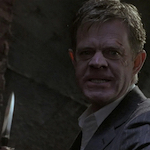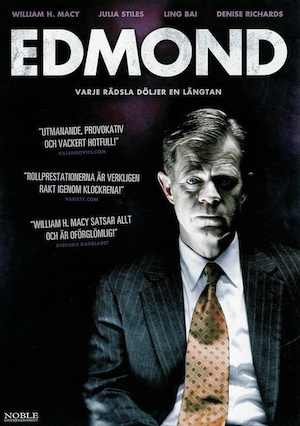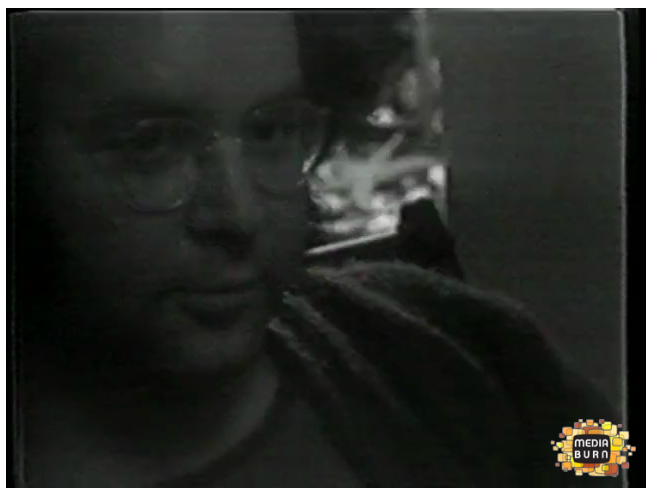 When we lost the great Stuart Gordon recently, I realized there were a few of his films I still hadn’t seen. It’s kind of nice, actually, to still have something left to discover. There’s a particular one that happens in space that involves truckers that I honestly have wanted to see since before it even came out, and somehow never have. It’ll be a few weeks before I can finally change that, because I decided to order a UK Blu-Ray instead of pay Amazon to stream it in standard def. But I wanted to watch this one first anyway – the one based on the David Mamet play.
When we lost the great Stuart Gordon recently, I realized there were a few of his films I still hadn’t seen. It’s kind of nice, actually, to still have something left to discover. There’s a particular one that happens in space that involves truckers that I honestly have wanted to see since before it even came out, and somehow never have. It’ll be a few weeks before I can finally change that, because I decided to order a UK Blu-Ray instead of pay Amazon to stream it in standard def. But I wanted to watch this one first anyway – the one based on the David Mamet play.
Gordon and Mamet, if you don’t know, go way back. Long before RE-ANIMATOR, Gordon was doing envelope-pushing theater work in Chicago. He directed, at his Organic Theater Company, the production of Sexual Perversity in Chicago credited with establishing Mamet as a playwright, although there was an earlier one starring William H. Macy, who also stars in this movie.
Here he plays Edmond Burke, a dude who works for some kind of financial firm called Stearns & Harrington. He’s apparently had a bad day (his meeting on Monday got pushed back to 1:15 – WHAT IN THE LIVING GOD DAMN FUCK!?) when he heads home and, on a whim, stops to get a tarot reading. She tells him “You don’t belong here.”
I don’t think he has any dialogue until he gets home to his wife (Rebecca Pidgeon, ALLEGIANT). She’s complaining to him about an antique lamp that needs fixed (“The girl broke the lamp,” she says about a maid or something) when he says, “I’m going.”
“Will you bring me back some cigarettes?” she says.
“I’m not coming back.”
“What?”
“I’m not coming back.”
“What do you mean?”
“I’m going, and I’m not going to come back.”
He explains that he doesn’t “want to live this kind of life.” He doesn’t love her. She doesn’t “interest” him “spiritually or sexually.”
 I think maybe for some people there’s some kind of suspicion about Pidgeon, because she’s Mamet’s wife who’s mainly known for being in his movies (though she’s in other stuff too), but she is great in this scene. She’s the first of several performers who come into the movie for brief encounters where they make me laugh with the authentic ways they sit and listen to the crazy bullshit spewing out of Edmond’s mouth. Her way is to respond with a bitter but underplayed sarcasm.
I think maybe for some people there’s some kind of suspicion about Pidgeon, because she’s Mamet’s wife who’s mainly known for being in his movies (though she’s in other stuff too), but she is great in this scene. She’s the first of several performers who come into the movie for brief encounters where they make me laugh with the authentic ways they sit and listen to the crazy bullshit spewing out of Edmond’s mouth. Her way is to respond with a bitter but underplayed sarcasm.
His first stop is a bar, where people like him – white men wearing suits and ties – sit by themselves drinking, with a basketball game on the TV. Joe Mantegna (HOUSE OF GAMES, THREE AMIGOS) is sitting next to him, and he’s the kind of guy who will just say to a stranger, “I’ll tell you who’s got it easy.”
“Who?”
And his answer is a word I don’t like to repeat that starts with the letter N. In case you’re wondering what to think of Edmond, his response is to nod and say “Yes,” as “Bar Patron” gives his racialist spiel about how he wishes he was black and he would “Rob a store. I don’t blame ‘em, I swear to God. Because I want to tell ya, we’re bred to do the things that we do.”
I see this as an extra fucked up INTO THE NIGHT meets TAXI DRIVER, or a Mamet version of FALLING DOWN. This uptight white collar doofus suddenly loses his shit, leaves his wife and stays out all night, mostly trying to get laid (as his racist friend recommended), but also indulging in abominable racism and violence, which he talks up as some kind of invigorating realization of his true self. I tell ya, I don’t like the guy.
Maybe it’s wishful thinking, but I don’t think Mamet or Gordon intend Edmond to start out relatable and cathartic in the way the character in FALLING DOWN is supposed to. In his calmer moments there’s a dry humor about his sense of entitlement. He goes to a strip club, a peep show, an escort service, and a pimp, each time trying to be friendly and polite, but haggling about the price and then getting frustrated and saying “It’s too much!” You expect him to ask for the manager.
I found something really funny but authentic about the way he comes into these transactions (or the one with the three card monty dealer) fully aware that they are trying to scam him, and still thinking he can convince them he’s a good guy and they’ll give him a good deal. He has no compunction about telling the stripper (WILD THING Denise Richards, who I think is genuinely good in her scene), the peep show girl (Bai Ling, SOUTHLAND TALES, WILD WILD WEST) or the escort (Mena Suvari, CARRIE 2, later in Gordon’s STUCK) to their faces that he wants to have sex with them but only if it’s, like, at a huge discount. And thinks he can seem progressive by asking about how much of a cut they get. He’s looking out for them as much as for him, you know.
And he never seems to figure out that he doesn’t need to tell them he’s never done this before. They don’t believe him and wouldn’t care if they did.
The character definitely has a little in common with FARGO’s Jerry Lundegaard: an outward awkward politeness that chips away under pressure and reveals a suppressed malevolence. That really comes out when the pimp (Lionel Mark Smith, a veteran of Mamet’s THE POSTMAN ALWAYS RINGS TWICE, THINGS CHANGE, HOMICIDE, THE SPANISH PRISONER, STATE AND MAIN and SPARTAN, but also Gordon’s KING OF THE ANTS and STUCK) tries to mug him. He doesn’t just defend himself, he savagely mutilates the guy, and enjoys yelling every racist thing he can think of while he does it. And then feels like a new man.
Julia Stiles (also in STATE AND MAIN) gets the “and” credit among this impressive cast for her role as Glenna, a random waitress Edmond propositions after he can’t scrap up enough cash for various professionals. I love the glazed over half-listening look she gives as she’s trying to take his order and he’s excitedly giving her a speech about “being alive.” But Glenna is full of unpredictable turns: first, she’s charmed by his declaration that he’s going to go home with her and fuck her, and she does it. Second, when he’s in his underwear swinging a knife in the air crazily yelling racial slurs and explaining that he might’ve killed a guy, she says, “That’s wonderful!” Third, she finally feels uncomfortable and asks him to leave because he says that just taking acting classes doesn’t make her a real actor.
To me the most scathingly observant scene is when he becomes a crazy yelling dude on a subway and threatens an old lady with his knife. As terrified as all the innocent passengers are, this is far from the worst thing he’s done at that point. But the thing that makes it so true is that his rage comes from telling her his mother had a hat like hers and not getting much of a response. I’ve seen so many non-life-threatening versions of this scenario. You know what, man – some random stranger doesn’t owe you a conversation. In this case, she’s very correct to be suspicious of you – you’ve already murdered one to two people tonight, and are about to yell obscenities and racial slurs at her. But you’re incensed that she doesn’t take your comment the way you think she should.
As he’s getting worked up into a psychotic frenzy, in between his threats and slurs there’s alot of defensive stuff: “What am I, a dog?” “You don’t know who I am! Is everybody in this town insane?” “I don’t need you! I worked all my life! I worked all my life! I worked all my life.” And when he’s taken in to the police station, trying to explain the incident, he starts to say at one point, “I am a solid—“ And that’s the attitude that seemed very familiar, very current (or timeless) to me. This idea of this can’t happen to me, you can’t question me, I don’t deserve this, I’m a solid citizen, I’m a good person. The subtext being that there are those other people who do deserve this. Just not me.
Mamet’s play Edmond premiered in 1982, with not-yet-in-any-movies Kenneth Branagh in the lead, and it sounds like the movie (which was adapted by Mamet) is pretty much unchanged. So it’s hard to say whether or not the playwright’s self-declared transformation into a conservative post 9-11 is relevant to what he was trying to say with this racially incendiary story. I never felt like they were verging on “If you think about it, this psychotic bigot kind of has a point” like FALLING DOWN, but it has a similar issue that (until the subway car and church at the end) every black character we’re seeing is a criminal who tries to hurt him. But I think this is somewhat justified by a satirically clueless thing he says (SPOILER) to his black cellmate in prison: “You know, I always thought white people should be in prison. I know it’s the black race we keep there, but I always thought white people should be there. You know why? To be with the black people. Does that sound too simple to you?”
He literally thinks white people have to go to a prison to meet black people. That means they’re not working at Stearns & Harrington, or going to that stockbroker bar. The only black people Edmond talks to are the ones on the streets in the middle of the night when he’s trying to pay for sex. That’s the kind of limited experience with people that leads to his wife assuming the “girl” broke their lamp on purpose, out of spite.
It’s in that last stretch that the always delightful Bokeem Woodbine (THE BUTCHER, RIDDICK) gets to be the last one to hilariously react to Edmond’s hot air. He stands and squints at his new cellmate’s pseudo-enlightened jibber-jabber about “we can’t distinguish between anxiety and fear” and interjects a few grunts every once in a while like
EDMOND: I think we wish for it. Death. Or burglars. Don’t you think? I always knew I would end up here. Every fear hides a wish. I think I’m gonna like it here.
CELLMATE: You do?
or
EDMOND: I think we’re like birds. We suspect when there’s going to be an earthquake. Birds know. They leave three days earlier.
CELLMATE: Birds leave when there’s gonna be an earthquake?
The cellmate listens to all that, looking vaguely amused, and then forces Edmond to blow him.
Woodbine is so great with so little dialogue. But I’m glad he gets another scene to do some philosophizing of his own. He’s really funny in that too.
In his journey, Edmond has encounters with a few Stuart Gordon Players: Frances Bay (THE PIT AND THE PENDULUM) as the fortune teller, Debi Mazar (SPACE TRUCKERS) as a madam, George Wendt (SPACE TRUCKERS, KING OF THE ANTS) as a Russian pawn shop owner, and of course Jeffrey Combs (RE-ANIMATOR, FROM BEYOND, THE PIT AND THE PENDULUM, ROBOT JOX, FORTRESS, CASTLE FREAK, STUCK) as a gay hotel clerk. It took me a second to recognize him. But it feels more to me like a Mamet movie. Gordon is just doing his thing to faithfully execute material he must’ve liked. It pushes buttons, it’s nasty, and the most uncomfortable thing he ever put on film, but he doesn’t throw in extra blood or anything.
Still, it’s an interesting intersection of his theater and film worlds. And though I’m a language-of-cinema guy and not at all a legitimate theater guy I’ve always found something appealing about movies like this. It has the limited locations and emphasis on performance and dialogue of a play, but it’s cinematic in its use of a moody jazz score (by Bobby Johnston, KING OF THE ANTS) and its seedy urban atmosphere.
“I like EDMOND” feels a little weird, so I’ll just say “EDMOND is an interesting ordeal to go through.”
Special thanks to my friend Jason B. for letting me use his Prime account!



























April 15th, 2020 at 10:49 am
Yup. I saw this one in the theater but entered late for some reason and Edmond was already on his quest, which added more inexplicableness to the experience. Who is this guy, where is he going, why? What’s it all about, Edmond? And I remained in that state all the way up to, of course, the last moment, and then it was like: ah.
Not a “good” movie, per se — you can really tell it’s an early Mamet play, that he is still figuring out how to wrangle his talent — but the kind of movie you’re glad you saw.